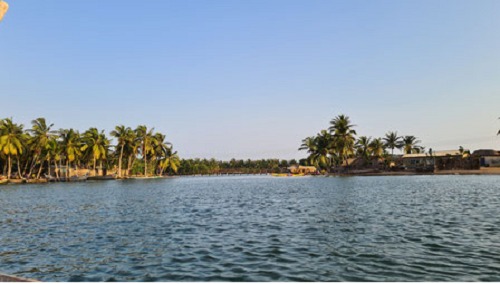Extreme climate events are powerfully putting our lives, progress and futures at high risks (Fig.1 & Fig.2). The real climate impacts on socio-ecological systems and national economy are rising and endangering the genuine vision of the AU Agenda 2063, the UN Sustainable Development Goals (SDGs), the Commonwealth Climate Charter and Paris Agreement for limiting global warming to 1.5oC.
It is collapsing coastal Earth systems, particularly causing substantial (in)visible damages to the Volta River Estuary (VRE), where Fuveme is located (Fig.3).
Besides galvanising for global journey to COP28UAE and beyond, this article highlights climate-induced Non-Economic Loss and Damage (NELD) to motivate and strengthen understanding of a critical need to reactivate innovative plans and solutions to minimise sufferings, while preserving environmental heritage for sustainability and prosperity.
Geozonal, delta prominence
VRE is in the south-eastern zone of Ghana. In addition to Ghana, the river itself spans the territorial boundaries of Togo, Benin, Ivory Coast, Mali and Burkina Faso, which are inhabited by 120 million people.
UNESCO recognises the delta as a biodiversity hotspot. The Volta River and Atlantic Ocean meet in-between Azizanya (near Ada Foah) and Kporkporkordzi (near Fuveme) within the shared geopolitical enclave co-inhabited by Ada, Anlo and Agave tribes.
Some settlements within 25km of the VRE are Agorme, Ada Foah, Nutekpor, Amedorme, Havui, Sogakope, Agorta and Adidokpo.
VRE uniquely exhibits the relics of savannas, wetlands and low-patched canopy forests, comprising species of borassus, baobabs, bamboos, oil palm, mangroves and coconut.
Oysters, crabs, insects and fishes like tilapia and shrimps are present. The coastal temperature alternates around 25 to 310C.
Emergency contexts of social climate impacts
The climate-induced NELDs are rapidly cascading across societal groupings, comprising aged, women, youth, children and persons with disabilities (PWDs).
Sea heating combines with storm floods from the Volta River to erode coastlines leading to significant loss and damage to human settlements, hydromobility and biodiversity with severe repercussions for food, heritage, shelter and well-being.
Comparing the destructive tidal havocs that happened in 2017 and 2021, it is clear that NELD had increased from 80 affected homes to nearly 4,000 marginalised households.
The incessant sea heating effects forced the disappearance of four indigenous villages alongside their rich social capital and biocultural properties from the Fuveme Island.
Today, some aged persons are homeless and/or co-habiting in temporal structures. Homelessness aggravates social, emotional and mental health issues for the aged and PWDs, who have no idea of when and how to reconstruct and resettle in their own decent homes again.
Socially cascading of the NELD, which was previously underestimated in scientific literature and reports, is currently impacting over 5,500 households.
Clearly, climate extremes have compounded social vulnerabilities and inequalities enabling a situation of living on less than US$1 a day to persist in the estuary.
Due to proximity to coastlines, the Fuveme Star of the Sea R.C. Basic School, for example, is daily impacted by frequent sea level rise.
Thousands of coconut trees are dead, uprooted or wilted at Havui, Azizanya and Fuveme (Fig. 2). For an aged farmer, such a loss is not just detrimental to survival, but also dignity, self-reliance and sustainability.
Mostly, recurrent sea level rise releases ‘seaheat’ to manipulate atmospheric temperature that wilts phytospecies or injects highly concentrated seawater to alter hydroregimes that kill oysters, earthworms, turtles or whales.
Since human society depends on coastal biodiversity for survival, harmful impact of sea heating on oyster habitats, for instance, is leading to livelihood loss, broken homes, child poverty, social exclusion and ecological job loss.
In Fuveme, tidal waves often submerge the basic school, where teaching and learning infrastructure has considerably deteriorated. The tidal happenings worsen child absenteeism in the school and, eventually, necessitate temporal closures thereby jeopardising future aspirations of the children. The UN SDGs cannot be achieved if unfriendly climate conditions for school children continue in Fuveme and other coastal settlements.
Collective action, policy futures
The deprived coastal societies need urgent support because sea level rise is extensively damaging lives and properties (Fig.1 & Fig.2).
The social cost of NELD is so huge that it is beyond financial compensation. Yet, with renewed ecoentrepreneurial mindset, fresh solution for NELD can be co-created and sustained overtime. Abundant indigenous knowledge exists about sustaining heritage pride, green infrastructure and eco-friendly homes.
The greener support looked-for, though, is an enhanced governance, financial and technical capacity to effectively integrate indigenous and scientific tools for sustainable management of NELDs to advance the SDGs.
Furthermore, a national Nature-based Solution (NbS) policy is needed for fostering locally-led adaptation, eco-wise residential buildings, renewables and mangrove reforestation. An inclusive NbS policy can contribute to combating negative impacts of flooding, erosion and species depletion for improved sustainable local livelihoods, fishing and biodiversity services.
Also, a multi-stakeholders’ dialogue and cooperation to push forward a theory of sustainable change is advised because ocean risks are too big to bear by an individual.
Warfare
Human limits are socially tipping such that at Fuveme, climate change is no longer an emergency matter but also a serious warfare that stakeholders must sustainably join forces of skills, innovation, finance and leadership to win.
The local people are faced with catastrophic polycrises of coastal erosion, sea level rise and storm flooding. The Fuveme Star of the Sea R.C. Basic School is a needful school in a typical ‘climate war zone’ that deserves public policy attention and collective humanitarian interventions to save lives.
The writer is a Research Fellow,
Earth System Governance Project,
Utrecht University, The Netherlands.
E-mail: doesylvan@yahoo.com

